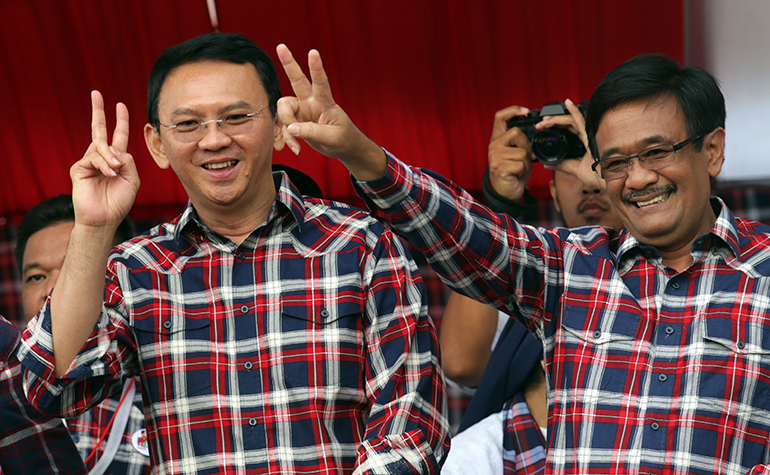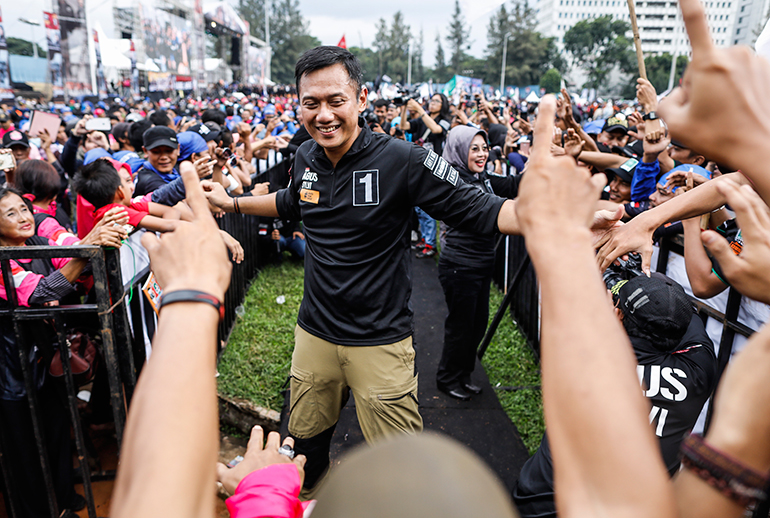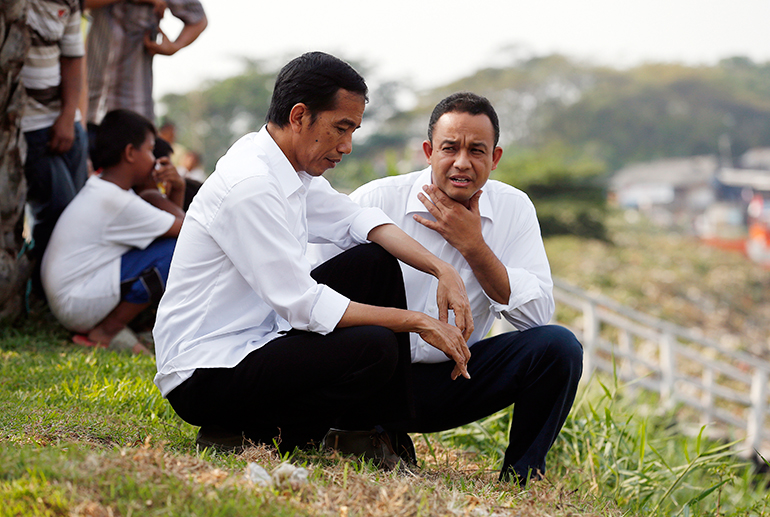As early as 2010, questions were being asked as to whether Jakarta had reached breaking point. Indonesia’s capital was severely overcrowded, dangerously polluted and its infrastructure was unbefitting a 20th century metropolis, let alone one racing through the 21st. It was even suggested by then-president Susilo Bambang Yudhoyono that it would be better for Indonesia to simply move its capital to another city.
Seven years on, things aren’t looking much better.
“Jakarta is one of the most broken megacities in the world,” said Jeffrey Winters, a political scientist at Northwestern University in Illinois, US. “It is slowly sinking below sea level, prone to debilitating floods during the rainy season and has worse traffic jams than any other urban area.”
If Jakarta is to deserve its status as the capital, and for its residents to enjoy the fruits of urban life, a great deal rests on the results of this month’s election, which will decide who will be governor. The February 15 election will be contested by three candidates, in addition to their respective running mates.

First is the 50-year-old incumbent Basuki Tjahaja Purnama, known as Ahok, the former deputy governor of Jakarta who took over the top job in 2014 following Joko Widodo’s successful presidential bid. He is seen as a political outsider, not only because he is Christian and ethnic Chinese, but because he is largely disconnected from the staples of Indonesian politics: family dynasties and party machinery.
Competing against Ahok is Agus Harimurti Yudhoyono, 38, the eldest son of former-president Yudhoyono. He has been derided by some as riding his father’s coattails and is widely considered too young and inexperienced for such an important role, particularly given that he has no political experience.
The final candidate is Anies Rasyid Baswedan, 47, an academic once included in Foreign Policy’s list of the top 100 public intellectuals in the world, who was sacked as minister of education and culture by Widodo in July.
Whoever comes out on top in the vote, the next governor will have a bulging in-tray. Fighting corruption will be a major task. “The city’s governors have been corrupt for decades, and they have worked with corrupt legislators to drive the capital into the ground,” said Winters. This changed, most commentators agree, with the ascendency of Widodo and has continued with Ahok. “It’s a major step forward that Jakarta now has a clean governor,” Winters added.
But Ahok has not been immune to corruption controversy, particularly over the graft-ridden Jakarta Bay reclamation project, a centrepiece of his time as governor. In response, Anies has campaigned heavily on anti-corruption – receiving a boost when the former Corruption Eradication Commission leaders, Bambang Widjojanto and Adnan Pandu Praja, joined his team.
Another important task will be tackling poverty in the city as income inequality continues to rise in Indonesia, especially in the capital. Ahok has been roundly criticised for his efforts to clean up the city, which included clearing squatter settlements and evicting the poor from contested land. That he resettled many of these evictees in low-cost apartments was seen by critics as strong-armed gentrification and by supporters as genuine social improvement.
Agus’ team has made income inequality central to its campaign. In December, the candidate announced that, if elected, he would boost welfare payments to poorer families by as much as $369 annually and partially distribute the city’s poverty reduction budget to smaller businesses to improve employment and wages.
Numerous other questions hang in the balance for the next governor: whether to continue with the controversial reclamation project; how to improve transport; and how to boost the capital’s economy. None will be easy to answer.

Despite this, policy has often been absent from candidates’ campaigns, with personality and political ties to the fore, and the election has frequently been overshadowed by a highly contentious blasphemy case against Ahok. In September, he angered Islamic conservatives during a speech when he referenced a verse from the Qur’an, telling voters they should not listen to religious leaders who use the verse to justify the claim that Muslims should not be led by non-Muslims. Following mass protests in November and December, Ahok was charged with blasphemy. At the time of writing, the case had not yet concluded.
Rather than local issues becoming national, the blasphemy scandal is an example of the national becoming local. The fact that many of the protestors at the anti-Ahok rallies were bussed in from outside the capital was seen as yet another example of political elites turning the elections into a national debate. “We see this was steered by political actors who were exploiting the situation,” President Widodo commented in November, before falling silent on the issue.
Ahok is essentially the establishment candidate. With his ties to Widodo and backing from two of the national ruling coalition’s largest parties, the Indonesian Democratic Party of Struggle and Golkar, attacks on Ahok are attacks on the government and president. And opposition parties are backing Ahok’s rivals. Indonesia’s third-largest party, Gerindra, controlled by powerful former military figure Prabowo Subianto, is supporting Anies. The vehicle of former president Yudhoyono, the Democratic Party, is backing its chairman’s son, Agus.
The Jakarta election is becoming an arena for the dynasties and elites of Indonesia to flex their muscles, according to Elizabeth Pisani, visiting senior research fellow at the Policy Institute, King’s College London, and author of Indonesia Etc: Exploring the Improbable Nation. “It seems likely that the power brokers of old – some reappearing in new clothing, mostly paramilitary uniforms and leather jackets of old swapped for turbans and white robes – will be reinserted into the electoral process, undermining the voice of individual voters,” she said.

Yet something more profound is also taking shape. According to Mustafa Izzuddin, a fellow at the Institute of Southeast Asian Studies’ Yusof Ishak Institute, Jakarta’s gubernatorial election, in fact, reflects Indonesia’s current political climate. For Izzuddin, this is typified by rising political polarisation across the country, “shaped by conflicts of both race and religion”.
Last year saw Islamic extremist groups coming to the fore and moderate politicians taking up more conservative positions. “Using race and religion as convenient political attack tools is nothing new to Indonesia. It simply means a reversion to business as usual,” said Ei Sun Oh, adjunct senior fellow at the S. Rajaratnam School of International Studies in Singapore.
For example, Anies came under fire when, on 1 December, he gave a speech to members of the Islamic Defenders Front (FPI), the conservative Islamist group that organised the rallies against Ahok. A subsequent photograph of Anies, who has long been considered a moderate, striking a friendly pose next to the FPI’s leader prompted Evan Laksmana, an analyst with the Centre for Strategic and International Studies in Indonesia, to tweet: “Will this picture be remembered as the day moderates die?”
In a further indication that the election acts as a barometer of the political climate, it is predicted that this month’s results will lay the groundwork for the direction of 2019’s presidential poll. The election puts the candidates at the “centre of the nation’s media bubble, so [they] get a huge amount of attention from the broadcast media… This makes the post a great springboard for national office,” said Pisani. In the words of Izzuddin, it is “akin to running for a mini-presidential election”.
Indeed, it was Widodo’s two-year tenure as governor of Jakarta that put him in the spotlight and gave him the momentum to go on to win the 2014 presidential race, and the same could become true for this year’s candidates. Pundits believe that, if successful in the race to become governor, Ahok will team up with Widodo once again as his running mate, campaigning to become vice-president in two years’ time. The elections could also set the national stage for Agus or Anies to challenge Widodo for the presidency in 2019.
The results, however, are looking increasingly uncertain. In November, most pollsters put Ahok well ahead of his rivals, but by mid-December Agus had overtaken him.
The polling organisation Indonesian Survey Circle gave Agus 33.6% of the vote, compared to the incumbent’s 27.1%. Similar results were found by other polling organisations, including Indonesia Politics Indicator, Poltracking and Charta Politika Indonesia. If none of the candidates receives 50% of the vote, a run-off between the top two candidates will take place, which seems likely if the opinion polls are correct.
Nevertheless, the commentators Southeast Asia Globe spoke to were in agreement that the contest will be tight, with none of them confident of predicting the outcome. “Indonesian citizens are quite level-headed in the privacy of the ballot box,” said Pisani, “but we live in confusing times.”


